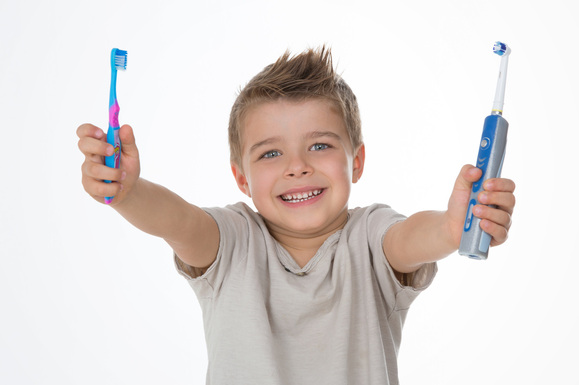Nine-year-old Nicholas Racobaldo doesn't remember what it's like to clean his teeth with an ordinary toothbrush. For two years, he's been using an electrically charged gadget with high-speed, rotating bristles.
"I like it because it tickles," he says, and imagines that now a regular toothbrush would feel "yucky" in his mouth.
Nicholas isn't the only kid who prefers the powered devices.
Eileen Hermiston, RDH, a pediatric dental hygienist at the University of Iowa College of Dentistry, says many of her patients think the high-tech brushes are fun.
"It can be a big power struggle getting children to brush their teeth," she notes. "If you can inspire enthusiasm in children with power toothbrushes, daily tooth brushing becomes easier."
If the increased amount of space taken up on store shelves is any indication, the electric brushes are growing in popularity. Some of them are kid-friendly: The toothbrush handle may take on the shape of a racing car or a mermaid or a cell phone, and its color may resemble army camouflage.
Many patients are now asking their dentists about these mechanical tools so much that the American Dental Association (ADA) has issued several news releases on the matter.
The organization says manual toothbrushes can be just as effective as powered ones. The key to preventing tooth decay, say experts, lies in the way a toothbrush -- electric or otherwise -- is used.
"If you are a wonderful brusher and a wonderful flosser ... then the manual toothbrushes are just great," says Kimberly Harms, DDS, an ADA consumer advisor who is also a dentist in Farmington, Minn. However, she says powered devices can help people who have trouble physically moving their brushes around their mouth to clean all teeth surfaces. These may include anyone with a motor disability or arthritis.
According to Cochran System Review,
http://oasisdiscussions.ca/2014/12/08/pem/
http://www.webmd.com/oral-health/features/ordinary-vs-powered-toothbrushes
"I like it because it tickles," he says, and imagines that now a regular toothbrush would feel "yucky" in his mouth.
Nicholas isn't the only kid who prefers the powered devices.
Eileen Hermiston, RDH, a pediatric dental hygienist at the University of Iowa College of Dentistry, says many of her patients think the high-tech brushes are fun.
"It can be a big power struggle getting children to brush their teeth," she notes. "If you can inspire enthusiasm in children with power toothbrushes, daily tooth brushing becomes easier."
If the increased amount of space taken up on store shelves is any indication, the electric brushes are growing in popularity. Some of them are kid-friendly: The toothbrush handle may take on the shape of a racing car or a mermaid or a cell phone, and its color may resemble army camouflage.
Many patients are now asking their dentists about these mechanical tools so much that the American Dental Association (ADA) has issued several news releases on the matter.
The organization says manual toothbrushes can be just as effective as powered ones. The key to preventing tooth decay, say experts, lies in the way a toothbrush -- electric or otherwise -- is used.
"If you are a wonderful brusher and a wonderful flosser ... then the manual toothbrushes are just great," says Kimberly Harms, DDS, an ADA consumer advisor who is also a dentist in Farmington, Minn. However, she says powered devices can help people who have trouble physically moving their brushes around their mouth to clean all teeth surfaces. These may include anyone with a motor disability or arthritis.
According to Cochran System Review,
- Powered toothbrushes reduce plaque and gingivitis more than manual tooth brushing in the short and long term.
- The evidence produced shows benefits in using a powered toothbrush when compared with a manual toothbrush. There was an 11% reduction in plaque at 1 to 3 months of use, and a 21% reduction in plaque when assessed after 3 months of use. For gingivitis, there was a 6% reduction at 1 to 3 months of use and an 11% reduction when assessed after 3 months of use. The benefits of this for long-term dental health are unclear.
- Few studies reported on side effects; any reported side effects were localised and only temporary.
http://oasisdiscussions.ca/2014/12/08/pem/
http://www.webmd.com/oral-health/features/ordinary-vs-powered-toothbrushes


